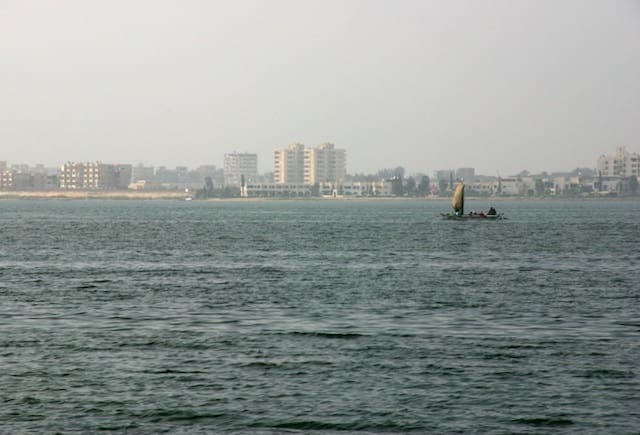By mid-morning we came upon Ismaïlia, located where the canal opens into Lake Timsah, which is about half way through the Suez Canal system. The heat of the day was already upon us and a brown cloud from a hundred thousand cooking fires hung over the crowded desert city. Fishermen cast and hauled in nets from boats with square sails swarming the lake, as their fathers had done since before the Pharaohs. A ferry, low in the water, crossed in front of Neko II, laden with soldiers in tan uniforms destine for an encampment on the east shore.
The soldiers did not look like men on their way to battle. My uncle, who survived the invasion of France at Omaha Beach on June 6, 1944, told me that the men in his company were grimfaced. Some prayed while others wrote farewell letters to loved ones. Others sat in wide-eyed silence, fearing that their lives would soon be cut short. I saw these same faces in Vietnam. The Egyptian soldiers looked like kids from my high school headed to a party on a Friday night. Their faces were radiant. They were on their way to do Allah’s work – to rid the world of Jews whose presence desecrated holy ground. Live or die, they knew that they would enjoy Allah’s blessing in the hereafter. A chill arced up my spine.
The military camp lacked any permanent buildings or roads and appeared hastily erected. It consisted of large tan tents arrayed on three sides of an assembly area, at the center of which was an Egyptian flag on a short flagpole. Rocks stolen from the canal embankment were used to line the perimeter of the assembly area. They looked like human skulls on bone colored sand.
The camp was a hive of activity and men were loading large crates, presumably filled with food, ammunition and other supplies, into the back of six-axle trucks that were parked on the far side of the tents. Other troops were excavating foxholes and bunkers, and filling defensive sandbags.
“You’ve got to let me off the boat at Ismaïlia,” Annie said to the Captain. It was a directive, not a question.
“No I don’t. We’re not stopping in Ismaïlia. In fact, I don’t plan to stop anywhere until we are safely into the Gulf of Suez. If the Egyptians are preparing another blockade, I don’t want to be stuck in the canal when it happens.”
Annie’s searched for a solution. She knew the Captain was right. Her eyes landed on Neko II’s dinghy.
“Would you let someone take me to port in the dinghy? They could probably drop me up and catch back up with Neko II in no time.”
The Captain assessed the request. He couldn’t afford the delay of searching for the dinghy if his men got lost or – worse – arrested. Finally he relented.
“Go. Go. Have Ibrahim take you. And Griffith.”
I was surprised to be chosen. Perhaps he thought I was the most expendable. Annie shook the Captain’s hand with a broad smile on her face, and then ran below deck to get her gear. She was back with her packed duffle bag and camera equipment before we had completed hoisting the dinghy into the water.
“Don’t forget these,” the Captain said as he handed Annie and me our passports.
The dinghy was a wooden four-man rowboat fitted with a buzzy little two-stroke outboard motor. I started the motor on the third pull of the knotted cord coiled around the crankshaft flywheel. Ibrahim sat on the bow and pointed me to a public dock. Annie folded dark blue bandanna into a large triangle and then tied it over the top of her head.
“It’s bad enough that I don’t have a veil over my face, but in Islamic backwaters like this it is unacceptable that my head be completely uncovered. They won’t like this either,” she said referring to the bandanna, “but it should get me by until I find a proper hijab.”
When the dinghy approached the dock I began to feel really obvious. I was deeply tanned, but I was many shades lighter than the men and women clogging the narrow dirt streets. There were no cars, only donkeys and camels. My t-shirt and shorts clashed with the jellabiyas worn by everyone else, including Ibrahim. Our presence would not go without notice and I wanted to get away from the dock as quickly possible.
“You’re a life saver,” Annie said when we nosed up to a creaky pier. She put an arm around my neck and kissed me on the cheek. “I’ll see you in a few months. Stay safe.”
“Me? You’re the one racing off to find a war.”
She climbed out of the boat and disappeared into the crowd.
“Take care.”
Ibrahim looked at me and raised his eyebrows as if to say, “Let’s go.” Obviously he was not any more comfortable sitting in a dinghy at this port with a pale-faced westerner than I was to be there. With a torque of the throttle we shot away from Ismaïlia and skimmed across the lake in search of Neko II.
[Read from the Beginning here. Read the Previous chapter here. Read the Next chapter here.]





Your account puts me in mind of some of the episodes of Pole to Pole. Palin got along very well with his assorted shipmates, and seemed rather emotional at the sendoff they gave him.
Any comparison of something I've written to the work of a Python is high praise indeed! Thank you.
Really enjoying your story, Bill. Can't wait for the next chapter. Seriously. I can't wait. Get the lead out!
Comments are closed.